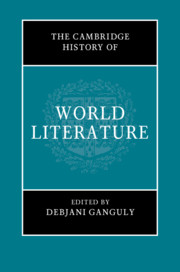Book contents
- The Cambridge History of World Literature
- The Cambridge History of World Literature
- Copyright page
- Contents
- Figures
- Contributors
- Acknowledgements
- Introduction
- Part I Genealogies
- Part II Thinking the World
- Part III Transregional Worlding
- 14 East Asia as Comparative Paradigm
- 15 Latin American Baroque: Or Error by Design
- 16 Comparative World Literature and Worlds in Portuguese
- 17 Africa and World Literature
- 18 Literary Revolution: Ireland and the World
- 19 Korean Worlds and Echoes from the Cold War
- 20 French Colonial Literature in Indochina: Colonial Adventure and Continental Drift
- 21 From Diasporic Tamil Literature to Global Tamil Literature
- Part IV Cartographic Shifts
- Part V World Literature and Translation
- Part VI Poetics, Genre, Intermediality
- Part VII Scales, Polysystems, Canons
- Part VIII Modes of Reading and Circulation
- Part IX The Worldly and the Planetary
- Index
- References
20 - French Colonial Literature in Indochina: Colonial Adventure and Continental Drift
from Part III - Transregional Worlding
Published online by Cambridge University Press: 17 August 2021
- The Cambridge History of World Literature
- The Cambridge History of World Literature
- Copyright page
- Contents
- Figures
- Contributors
- Acknowledgements
- Introduction
- Part I Genealogies
- Part II Thinking the World
- Part III Transregional Worlding
- 14 East Asia as Comparative Paradigm
- 15 Latin American Baroque: Or Error by Design
- 16 Comparative World Literature and Worlds in Portuguese
- 17 Africa and World Literature
- 18 Literary Revolution: Ireland and the World
- 19 Korean Worlds and Echoes from the Cold War
- 20 French Colonial Literature in Indochina: Colonial Adventure and Continental Drift
- 21 From Diasporic Tamil Literature to Global Tamil Literature
- Part IV Cartographic Shifts
- Part V World Literature and Translation
- Part VI Poetics, Genre, Intermediality
- Part VII Scales, Polysystems, Canons
- Part VIII Modes of Reading and Circulation
- Part IX The Worldly and the Planetary
- Index
- References
Summary
This essay draws on Pheng Cheah’s insights in What is a World? to examine the contrasting spatiotemporalities of colonial adventure and continental drift in French Indochinese colonial-exotic literature of the 1920s and 1930s. I look first at how the genre worlds in a narrow, linear sense, discursively mapping the spatialized colony in concert with imperialist projections. The focus here is on the ways in which these novels chart the advance of capital through the colony as a spatial category, a distant and subordinate appendage of France, the global center. I then consider Jean d’Esme’s Les Dieux rouges (The Red Gods: A Romance, 1923) as a deviation from the conventions of the genre and the calculated path it lays out. Equal parts colonial-exotic and speculative fiction, Les Dieux rouges tells an alternative geological history of continental drift that undoes the colonizer’s materialist assumptions about the natural world. Through the creation of a parallel, prehistoric world inside the colony but outside the reach of empire, D’Esme’s novel demonstrates a profound dis-ease with the colonial project, an anxiety that, unlike the hesitation that marked many narratives of the period, points to France’s ultimate inability to map Indochina – physically, temporally, or epistemologically – and by extension, the rest of la plus grande France. Les Dieux rouges worlds the colony in the Heideggerian sense by opening up an alternative temporality within it, by imagining, in Cheah’s words, “a force that subtends and exceeds all human calculations that reduce the world as temporal structure to the sum of objects in space” (8). The novel returns the colonizer to the beginning of human time and the human race, not to imply simply that colonialism is a regression, but to challenge the ontological and political realities upon which imperialist assumptions are based.
- Type
- Chapter
- Information
- The Cambridge History of World Literature , pp. 379 - 392Publisher: Cambridge University PressPrint publication year: 2021



